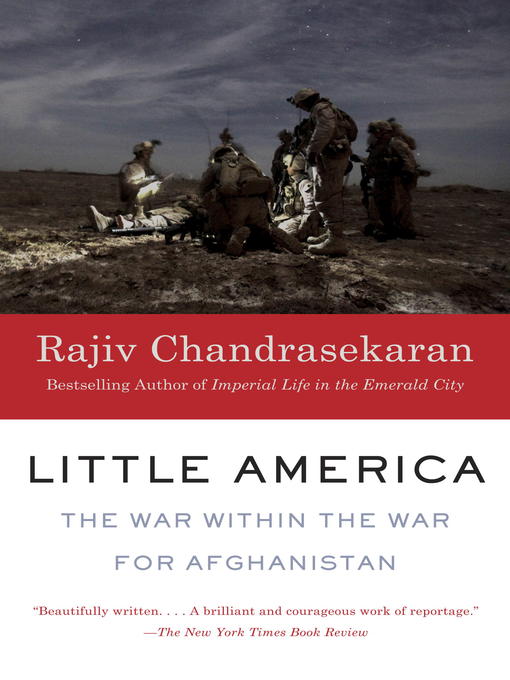
Little America
The War Within the War for Afghanistan
کتاب های مرتبط
- اطلاعات
- نقد و بررسی
- دیدگاه کاربران
نقد و بررسی

Starred review from May 28, 2012
Chandrasekaran, senior correspondent and associate editor of the Washington Post, follows his award-winning analysis of postinvasion Iraq, Imperial Life in the Emerald City, with a searing indictment of how President Barack Obama’s 2009 Afghanistan surge was carried out. Drawing on his reporting from Afghanistan over a period of two and a half years and over 70 interviews conducted for this project, the author examines the Obama administration’s efforts to “resuscitate a flatlining war.” What he finds in his extensive travels, especially in the strategic southern provinces of Helmand and Kandahar, is a smorgasbord of incompetence, venality, and infighting. It’s only when the Marines pivot away from counterinsurgency—on which the surge is predicated—to counterterrorism that they begin “to shift the momentum of the war.” This success proves temporary when Obama begins to reverse the surge and the Taliban switch to a “long-term game.” Chandrasekaran argues that the surge was “a missed opportunity” and that its failure rests largely with “the American bureaucracy”: a Pentagon that was “too tribal”; incompetent civilian officials, especially at USAID; and a flawed Obama policy to go “big” instead of going “long.” Solid and timely reporting, crackling prose, and more than a little controversy will make this one of the summer’s hot reads. Agent: Rafe Sagalyn, Sagalyn Literary Agency.

July 15, 2012
As Afghanistan prepares for the withdrawal of American troops, Washington Post senior correspondent and associate editor Chandrasekaran (Imperial Life in the Emerald City, 2006) delivers a clearheaded assessment of events since the war began, showing that precious little progress has been made. America has been engaging in utopian schemes to remake Afghanistan for far longer than most people realize--e.g., in the 1940s and '50s, American engineers planted model villages in the Helmand River Valley in the vain hope that modernity would spread infectiously across Central Asia. Now, Marines battle insurgents for control of these remote outposts, as the local population continues to live much as they did centuries ago. Chandrasekaran captures the absurdity of a bumbling bureaucracy attempting to reengineer in its own image a society that is half a world away. Though the prose is workmanlike, the author's account of infighting and ineptitude in Afghanistan is well-researched and compelling. Development consultants further their own careers by accepting brief postings in the country where they spend their time counting the hours until their departure and socializing at embassy parties while rarely leaving their fortified bases or interacting with ordinary Afghans. Different factions within the State Department, the military, NATO and the development community pursue conflicting and mutually exclusive priorities, largely by funneling massive amounts of cash through the patronage networks of various corrupt local leaders. The complete lack of effective oversight ensures that most of the money has little lasting impact and some ends up in the hands of the Taliban. Based on extensive interviews with participants in the reconstruction effort and his own observations from some of the most volatile districts, Chandrasekaran systematically condemns the missed opportunities and the wasted resources of the campaign. "For years, we dwelled on the limitations of the Afghans," he writes. "We should have focused on ours." A timely, convincing portrait of an occupation in crisis, with much to teach anyone involved in diplomacy or international aid.
COPYRIGHT(2012) Kirkus Reviews, ALL RIGHTS RESERVED.

January 1, 2012
Having taken on America's pie-in-the-sky planning for the Iraq occupation in "Life in the Emerald City", an Overseas Press Club Book Award winner, Chandrasekaran considers the "war within the war" in southern Afghanistan. There, the military parted ways with President Obama's directives as nation building gave way to compromise. Important documentation I hope readers aren't too jaded to consider; with a 100,000-copy first printing.
Copyright 2012 Library Journal, LLC Used with permission.

July 1, 2012
Chandrasekaran (Imperial Life in the Emerald City, 2006) examines the ongoing failure of the U.S. military and diplomatic corps to achieve (or even agree upon) their objectives in pursuit of a new Afghanistan. Focusing primarily on the volatile provinces in the south, Chandrasekaran emphasizes the magnitude of U.S. ambition (not a new thing, as evidenced by the massive dam-building and irrigation projects attempted as early as 1951) and also the constant drumbeat of failure, the result of inconsistent priorities, cultural and geographical ignorance, and pointless political turf wars played out through budget line-items. The core problem, he asserts, is tribalism, not among the Afghans but between and within the Pentagon, the State Department, and USAID. Despite spending years, lives, and billions of dollars trying to defeat insurgents, improve governance, and grow crops (other than poppies) in the salty soil of the Helmand Valley, incompetence and administrative chaos have prevailed, and the longest and most complicated war in American history continues. Drawing on interviews with key participants and three years of firsthand reportage, Chandrasekaran provides no easy solutions but delivers a bracing diagnosis of the problem.(Reprinted with permission of Booklist, copyright 2012, American Library Association.)

























دیدگاه کاربران